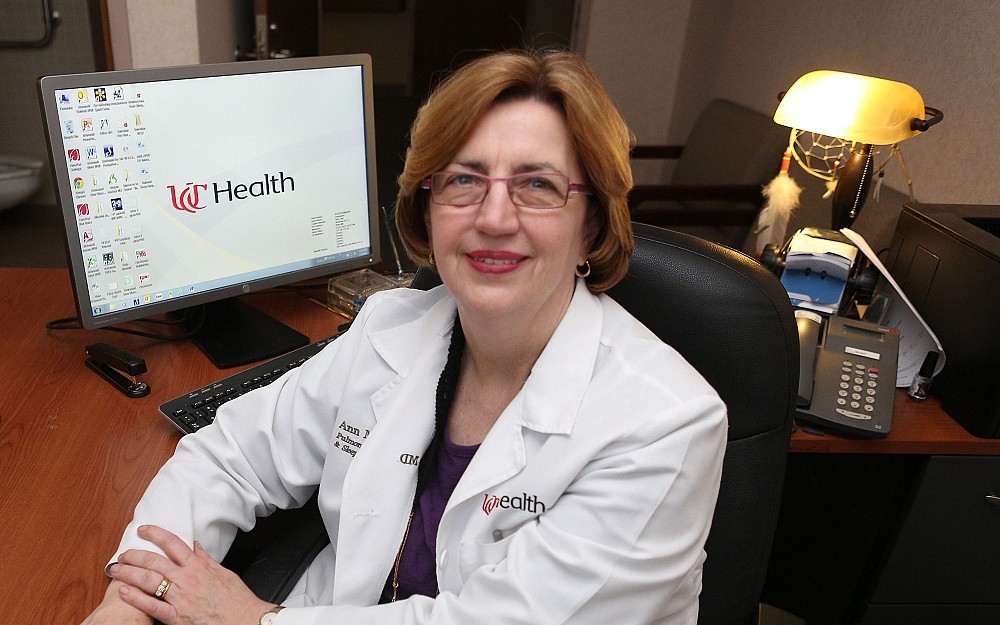
HEALTH LINE: Getting Enough Sleep Really Isn't Optional
CINCINNATIThe typical adult needs 7 to 7 1/2 hours of sleep each night, while for teenagers and young adults under 25 about 9 to 10 hours of sleep per night is recommended, says Ann Romaker, MD, director of the University of Cincinnati Medical Center Sleep Medicine Center.
Sleep deprivation can lead to problems with memory, heart disease, diabetes and stroke. About 40 million Americans each year suffer from chronic, long-term sleep disorders and an additional 20 million experience occasional sleeping problems, according to the National Institute of Neurological Disorders and Stroke.
"There are sleep-related genes in every tissue of the body, genes that turn on only during sleep and genes that turn on only when you are awake, says Romaker, an associate professor in the Division of Pulmonary, Critical Care and Sleep Medicine at the University of Cincinnati College of Medicine. "The genes in the heart and lung that turn on during sleep are genes that are needed for repair. The genes that turn on during the day have more to do with power and endurance. If you dont get enough sleep your heart and lungs dont repair like they are supposed to.
Romaker cited a 2008 study at the University of Chicago which found that one extra hour of sleep per night (from 6 to 7 hours nightly) appears to decrease the risk of coronary artery calcification, an early marker for cardiovascular disease. The benefit of the additional hour of sleep was comparable to gains from lowering blood systolic blood pressure by 17 mm Hg, according to the University of Chicago.
The research focused on 495 participants, primarily healthy middle-aged individuals, who were part of the Coronary Artery Risk Development in Young Adults study begun in 1985.
The University of Chicago reported that about 12 percent of those in the study first developed coronary artery calcification over five years of follow-up. In about 27 percent of participants who slept less than 5 hours per night calcified arteries were found, according to the university. For individuals who slept 5 to 7 hours nightly only 11 percent of participants were affected with calcified arteries. The number of participants with calcified arteries fell to 6 percent for those who slept more than 7 hours per night, the University of Chicago reported.
"Thats a big deal, says Romaker. "Its important to make time for sleep. Its really not optional.
Sleep also affects memory and different stages of sleep are required for different types of memory, says Romaker. "Many studies have shown that students who dont get enough sleep, their performance on tests is significantly worse. Memory is much better if you study and then sleep versus if you stay up all night. Your performance on a test is significantly improved.
Researchers at Havard University have also found that sleep deprivation is linked to diabetes, weight gain and hypertension.
To pave the way for better sleep, the National Sleep Foundation offers the following simple tips:
Stick to a sleep schedule, even on weekends.
Practice a relaxing bedtime ritual.
Exercise daily.
Evaluate your bedroom to ensure ideal temperature, sound and light.
Sleep on a comfortable mattress and pillow.
Beware of hidden sleep stealers such as alcohol and caffeine.
Turn off electronic devices before bed.
The National Sleep Foundation is hosting National Sleep Awareness Week, March 2-8, 2015an annual event that coincides with the beginning of daylight saving time. The foundation conducts the 2015 Sleep in America Poll, which is now available at http://sleepfoundation.org/sleep-polls-data/2015-sleep-and-pain.
For more information about the University of Cincinnati Medical Center Sleep Medicine Center, visit http://uchealth.com/services/sleep-medicine/ or call 513-475-7500.
Related Stories
Growing heart failure epidemic calls for prioritizing primary...
May 5, 2025
A rapidly growing heart failure epidemic calls for prioritizing primary prevention, according to a new scientific statement from the American Heart Association published in Circulation in April. The statement reviews the current evidence for predicting heart failure risk and offers risk-based strategies for heart failure prevention.
Machine learning brings new insights to cell’s role in...
April 30, 2025
Researchers led by the University of Cincinnati’s Anna Kruyer and the University of Houston’s Demetrio Labate have published research in the journal Science Advances applying object recognition technology to track changes in brain cell structure and provide new insights into how the brain responds to heroin use, withdrawal and relapse.
Most teens prescribed SSRIs did not have recommended follow-up...
April 30, 2025
The University of Cincinnati and Cincinnati Children's Hospital Medical Center's Martine Lamy commented to Medscape on new research that found fewer than half of the adolescents prescribed a selective serotonin reuptake inhibitor (SSRI) at two large Chicago pediatric primary care clinics had a follow-up visit within the recommended 6 weeks.
